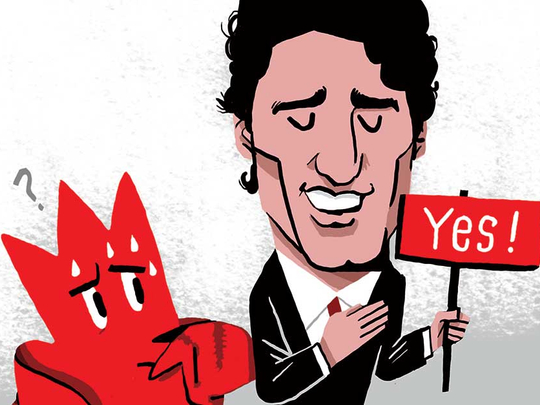
Canada is not a country whose politicians have been particularly comfortable saying ‘no’ to questions involving immigration. The previous Conservative government raised rates to a 50-year high, and it’s this legacy that the progressive administration of Prime Minister Justin Trudeau seeks to outshine.
Back in January, following the rollout of United States President Donald Trump’s ill-fated travel ban, the prime minister ratcheted his immigration rhetoric to new heights of unqualified generosity. “To those fleeing persecution, terror & war,” he tweeted, “Canadians will welcome you, regardless of your faith.” In March, he further assured the non-Canadian world that “regardless of who you are or where you come from, there’s always a place for you in Canada”.
It would be unfair to suggest Trudeau’s words are the sole reason Canada has seen an influx of Haitian migrants from the United States in recent weeks (though evidence suggests that urban legends within the Haitian community about Canadian immigration policy are playing a significant role). What is clear, however, is that Trudeau’s “yes to everyone” posture has left him ill-equipped to handle the reality that a rules-based immigration system — and indeed, the national interest — requires a leader with the capacity to say no once in a while.
It’s estimated that close to 7,000 migrants from the US, predominantly of Haitian descent, have crossed the Quebec border this summer. The vast majority have done so illegally, though the preferred euphemism is “irregularly”, as most do allow themselves to be apprehended by immigration authorities once on Canadian soil, in order to begin a bureaucratic process that wouldn’t have been instigated if they attempted to enter legally (Canadian law doesn’t recognize asylum claims from American-based persons). Either way, the inflow is far in excess of what Canada’s refugee infrastructure is equipped to handle, with hundreds of migrants now housed in Montreal’s old Olympic stadium and a tent village built by the army.
Though they’ve been lazily framed as “fleeing Trump,” most of the Haitians appear motivated by a desire to dodge American laws they don’t care to obey. Many were living in the US under the protections of an Obama-era waiver issued after Haiti’s devastating 2010 earthquake, intended to guarantee a temporary American home for those who couldn’t return to their native one. Seven years later, Haiti, while not completely back to normal, has undeniably made significant progress rebuilding, with a corresponding decrease in homelessness. It’s far from anyone’s definition of paradise, but as a country with free elections, civil liberties and a scheduled withdrawal of UN forces, it’s not some genocidal nightmare dictatorship, either.
It was for this reason that Canada’s former Conservative government removed Haitians from its “do not deport” list in 2014 (reaffirmed by Trudeau last year) and why the Trump administration plans to follow suit and may revoke their “Temporary Protected Status” designation sometime next year. Under both US and Canadian law, many Haitians have simply reached the end of a grace period they always knew would be temporary. This is nothing new, as Haitians in North America have been granted similar bouts of temporary reprieve from deportation in the past, only to see them revoked, or at least not renewed, once the motivating context is deemed to have changed.
On the other hand, any Haitian leaving the US on the assumption that Canada will be comparatively lax in enforcing its broadly similar immigration rules isn’t wrong, either. Though Ottawa is theoretically prepared to deport most of the irregular Haitian border-crossers to Haiti, in practice, Canada’s refugee adjudication system is a molasses-paced, overburdened mess prone to empty threats over decisive action. Some of this is by design — opportunities for appeals are vast — some of it the result of political decisions, such as the Trudeau administration’s righteously gigantic intake of Syrian migrants, or its 2016 elimination of visa requirements for Mexican visitors (which saw Mexican asylum claims spike). Depending on the country, it can now take years before an (initial) asylum claim is ruled valid or not, with a recent government report estimating the average wait could get as high as 11 years by 2021. For those who have made it to Canadian territory, this “limbo” can be fairly comfortable given the heightened funding Trudeau’s Liberals have invested in health coverage for unprocessed asylum claimants — to say nothing of the welfare checks that will be soon handed out by the Quebec provincial government.
In a Facebook video the other day, Michelle Rempel, the Conservative Party’s persistent and articulate critic for immigration affairs, gave the prime minister some unsolicited tips for how to get a handle on the border situation, such as clearly and unambiguously stating “Canada does not want people illegally entering the country.” There doesn’t seem to be much evidence that taking her advice would be politically dangerous — polls have shown strong antipathy to the “irregulars” — but appeals to common sense miss the awkward fact that the status quo, however problematic, is helping fulfil one of Trudeau’s most oft-stated ideological goals: Getting more people to Canada and creating a more interestingly “diverse” country.
At this point, for Trudeau to simply proclaim some sort of amnesty would offer a far easier way out than continuing to feign faith in a legal process that it’s clear his government isn’t terribly committed to, as either a practical or moral matter. Such a move would be ethically repugnant and monstrously controversial, but if this prime minister were to ever expend a significant chunk of his leadership capital on a high-risk gamble, it would probably be something like this.
— Washington Post
J.J. McCullough, a political commentator and cartoonist from Vancouver, is a columnist at Loonie Politics.









